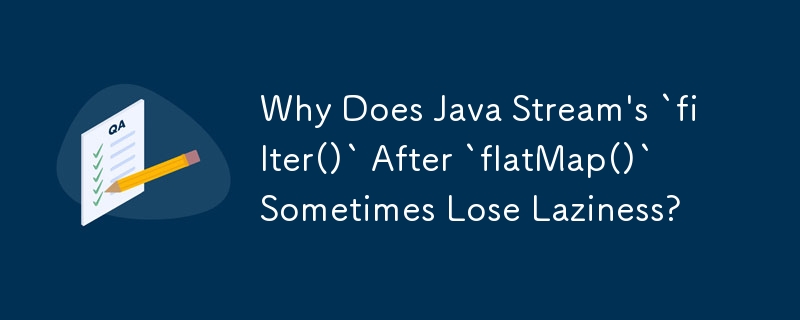

Java Stream Filter After FlatMap Not Completely Lazy
Java streams provide a way to process data pipelines through a sequence of transformations. Intermediate operations are typically lazy, meaning they are not executed until a terminal operation is called. However, it has been observed that applying filter() after flatMap() in certain scenarios can lead to non-lazy behavior.
Example Code
Consider the following code:
System.out.println(
"Result: " +
Stream.of(1, 2, 3)
.filter(i -> {
System.out.println(i);
return true;
})
.findFirst()
.get()
);
System.out.println("-----------");
System.out.println(
"Result: " +
Stream.of(1, 2, 3)
.flatMap(i -> Stream.of(i - 1, i, i + 1))
.flatMap(i -> Stream.of(i - 1, i, i + 1))
.filter(i -> {
System.out.println(i);
return true;
})
.findFirst()
.get()
);Output
1 Result: 1 ----------- -1 0 1 0 1 2 1 2 3 Result: -1
Explanation
In the first case, the filtering operation is applied before the flatMap(), resulting in lazy evaluation. The evaluation stops at the first matching element (1).
In the second case, the flatMap() operation creates a new stream of nine elements (-1, 0, 1, 0, 1, 2, 1, 2, 3). The subsequent filter() operation is applied to each of these elements, resulting in non-lazy behavior. Despite finding a matching element (-1), the evaluation continues to process all the elements in the stream.
Fix
This issue has been addressed in JDK-8075939 and fixed in Java 10. It was backported to Java 8 in JDK-8225328.
The fix ensures that the lazy evaluation is maintained in the presence of both flatMap() and filter() operations. This means that the evaluation will now terminate as soon as a matching element is found.
Implications
This fix resolves issues that can arise from the non-lazy behavior when using flatMap() and filter(). It improves the performance and correctness of stream pipelines in cases where early termination is expected.
The above is the detailed content of Why Does Java Stream's `filter()` After `flatMap()` Sometimes Lose Laziness?. For more information, please follow other related articles on the PHP Chinese website!




